- Overview
- Trip Outline
- Trip Inclusions
- Trip Exclusions
- Gallery
- Reviews
- Book Now
- FAQ
"Kashmir has always been more than a mere place. It has the quality of an experience, or a state of mind, or perhaps an ideal.“ - Jan Morris
The Trek
Tarsar Marsar puts on display everything you expect from a trek in Kashmir. Firstly, the base for the trek is one of the most beautiful villages you can see, Aru. Secondly, the trail takes you through some of the most beautiful forests and meadows that you can see! Thirdly, this trek offers some of the best campsites you will see. And lastly, the sight of the alpine lakes will leave you speechless!
The Area
Trekking in Kashmir is a unique experience. Not only are the Kashmir treks one of the most beautiful ones you would ever do, the terrain is also very exclusive. The scenes and views you see here are difficult to find anywhere else. The alpine lakes coupled with lush green meadows and wide valleys make a splendid setting–giving you a view to die for. The best of campsites are found in Kashmir and they are often at the shores of a beautiful alpine lake.
On this trek you would be trekking in south Kashmir in the Pir Panjal range. The nearest big town is Pahalgam and the trek starts in a beautiful, tiny hamlet, Aru. The Dachigam National Park borders Marsar. The area is rich in flora and fauna. The trek runs very close to the Amarnath Yatra adding to the feeling of safety.
Expected Weather
- Chances of Rain/Hail - Mild to moderate showers expected in short spells
- Snow on Trail - Possible
- Temperatures - Afternoons upto 20 degrees; Nights around -7 degrees
Day 1: Drive from Srinagar to Aru (2424m)
Drive time: 4 hours (with breaks). Overnight at homestay / hotel in Aru
Day 2: Trek from Aru to Homwas (3503m)
Distance: 13 kms, Trek time: 8 hours. Overnight stay in camps.
Day 3: Trek from Homwas to Tarsar (3792m)
Distance: 7 kms, Trek time: 5 hours. Overnight stay in camps.
Day 4: Exploration day at Tarsar
Distance: 4 kms, Trek time: 3 hours. Overnight stay in camps.
Day 5: Trek from Tarsar to Sundersar (3945m)
Distance: 5 kms, Trek time: 4 hours. Overnight stay in camps.
Day 6: Trek from Sundersarto Sangam ground (3500m)
Distance: 8 kms, Trek time: 6 hours. Overnight stay in camps.
Day 7: Trek From Sangam ground to Aru
Distance: 13 kms, Trek time: 6 hours. Drive back to Srinagar.
Day 8: Buffer Day- This is an optional day only if the weather turns bad. Please account for this while booking your flight/ train tickets.
• Complete stay and accommodation during the entire duration of the trek from Aru to Aru.
• Transport to Aru (the Base) from Srinagar, Dal Lake, gate no. 1. (both ways)
• All meals starting from evening tea on the first day to lunch on the last day.
• Rentals for all common gear provided to you like tent, sleeping bags, etc.
• Forest Entry Permission, Guide and expertise charges.
- 5% GST
- Meals or drinks purchased by participants during the travel or trek (example biscuits, fruits, etc.)
- Rentals for personal clothes
- Flight/Train/Bus ticket till Srinagar.
- Backpack offloading charges. You are expected to carry your own backpack. Trekkers unable to do so can opt for a porterage service at ₹400/day
- Staff Tips
Plan to arrive in Srinagar on Day 1 by 09:30AM latest. Your pick up will be from Dal Lake, Gate no.1 at 10:00AM on Day 1. Alternately you could arrive in Srinagar the day before and stay a night in Srinagar (at own cost). Plan your return (departure) from Srinagar on Day 8 (accounting for buffer day) after 5PM in the evening.
Ahdoos hotel (little upscale)
The Grand Mamta near Dal lake (most recommended)
Hotel Ashai Heritage Colonial Bungalow - 3kms from Dal Lake. (No food options. Very spacious and vintage.)
Noor guest house near Dal lake Gate no.1 (budget hotel)
A certified trek leader, a guide, cook & porters will accompany you during the trek.
The common perception is that alcohol makes you feel warmer, however it also dehydrates you & dehydration can be fatal while trekking. Hence consumption of alcohol is prohibited. Smoking in camps is not allowed.
We’ve been organizing treks for over five years and have had many female trekkers trek with us. In fact, a lot of them come solo for treks. There has never been a complaint about the atmosphere of a trek, about other trekkers or our professionalism. They have all been kind enough to leave a review.
You will be sleeping in twos or threes in your tents in sleeping bags. The sleeping bags are snug and comfortable. We will be providing inflatable pillows.
In all the camps where the accommodation is in tea houses/ home stays, there will be proper toilets. The toilets are mostly western, in case if they‘re Indian, then we try to provide a toilet seat most of the times.
On the day of camping, we will have toilet tents (with a dry pit toilet), the most hygienic way of answering nature’s call.
A dry pit toilet is an eco-friendly sanitation solution featuring a pit dug into the ground, topped with a toilet seat and a wrought iron stand. Near the toilet, a pile of mud, sand, or coco peat is provided for covering waste after use, facilitating rapid breakdown of fecal matter due to increased microbial activity. This method eliminates the need for water, thereby preventing contamination of nearby water sources, as water toilets are prohibited at campsites.
While toilet paper is available, please use it sparingly to avoid overloading the pit, which can take years to decompose. Please refrain from using wet wipes as they are not biodegradable or use biodegradable wipes.
Through the trek, there are no bathing facilities at campsites. Trekkers often take advantage of running streams to freshen themselves up.
No. Guests are expected to carry their own power banks.
Good Sturdy Backpack: Prefer a trekking pack over a backpacking one. The size of the backpack depends upon the participant. Normally for a 5-6 day trek a 40-50 litre pack should suffice.
Shoes: Any waterproof trek (not hike) shoe would be ideal.
Socks: 3 pair cottons and 2 pairs of woollens.
Trek pants (ideally water resistant): They are very important and help you a great deal on your trek. You can get two quick dry summer trek pants. If you don’t have a trek pants, you can replace it with Gym track pants. Don’t trek in Jeans/ Pants.
T-shirt/ Base layer: One can get 2 T-shirts/ trekking base layer on the trek, one of which can be full sleeved. Avoid cotton and prefer dry fit.
Fleece/ Sweater/ good quality Hoodie: 1 fleece jacket or sweater. Fleece is preferred over sweater (or hoodie) as it is lightweight and easy to carry. Sweaters and Jackets can be heavier than Fleece for the warmth they offer.
Down/ Padded Jacket – Down/ Padded jacket (Upto -5 degrees). If you don’t want to get a padded/ down jacket, get two fleeces.
Cotton track pants for camp – These are specifically for cold evenings at the campsite. This can be ignored if you are comfortable wearing your trekking pants in the camp.
Thermals: 1 pair. We wear thermals only upon reaching the campsite not while trekking.
Windproof Jacket: All rain proof can be used as wind proofs. Required as an additional layer during trekking in windy conditions. Avoid if you have a rain proof jacket.
Rainwear:
Option 1 – Rain set: One Waterproof jacket (3000 mm waterproofing), Rain proof pants and Bag cover
Option 2 – Poncho: Covers your body and bag completely.
We recommend Option 1 as poncho makes trekking difficult.
Woolen Cap/ Balaclava-1: To cover your ears, head and neck. Get one woollen cap and one neck warmer or balaclava.
Neck Warmer/ Scarf - 1: For evenings. Avoid if you are comfortable using a Balaclava.
Gloves: 2 gloves out of which 1 can be waterproof and one woollen. The waterproof one has to ideally be larger than you normally use so that you can wear both your gloves together if required.
Suncap – 1
Sunglasses – 1
Toiletries – Also include sunscreen, moisturizer and lip-cream
Headlamp/ Torch -1. Preferably head lamp.
Trekking pole
2 water bottles (1 litre each) – One can also get a hydration pack.
Camp shoes/ Flip flops for camp
Plastic covers for inside the backpack to keep your clothes dry
Daypack – Required if you have a summit days climb. Preferably one that can be compressed.
Documents: 2 passport sized photograph, Address and Photo proof (Driving License or Aadhaar card), Doctor’s medical certificate saying that you are fit for the trek. We reserve the right to not take you on the trek if you fail to produce this.
Trekking pole
Meals will be provided by us. However you may carry snack items to much on like dry fruits, biscuits, chocolates, protein bars, or nuts.
Yes, you are ideally expected to carry your backpack. But you do have an option of offloading your bags on a mule for an additional cost. The cost will be INR 400/ per day per bag (weight not exceeding 8kg). One is expected to inform us about offloading 1 week prior to the trek.
Yes, provided you prepare well.
You can prepare for the trek with a combination of Cardio & Strength activities
4-5 kms slow jog OR 6-7 kms Brisk walking OR 25 kms cycling. Pace is not important, consistency is important (non-stop jogging/running/cycling)
Squats 20 x 3, Lunges 20 x 3, Calf raises 20 x 3
All of the above at least 4 times a week
Climbing stairs 40 floors with backpack (Atleast once a week)
If you cancel –
– 60 days before the trip: we can process a complete refund minus minimum processing charges.
– Between 30-45 days before the trip: you will be refunded 50% of the trek fee.
– Within 30 days before the trek starts: No refund.
– If your spot is replaced in a full batch: we will process a complete refund after canceling minute operational charges. (For fixed departures only)


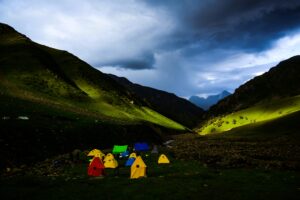
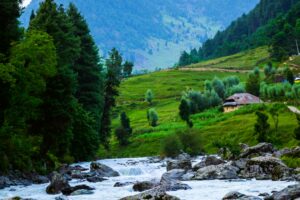
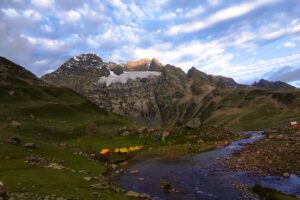
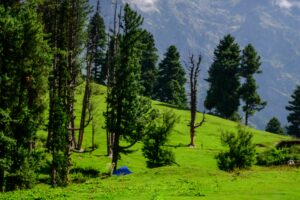
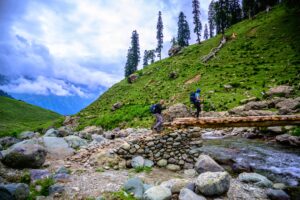
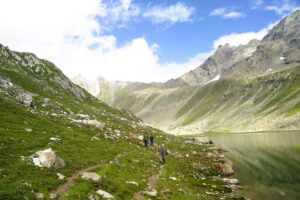
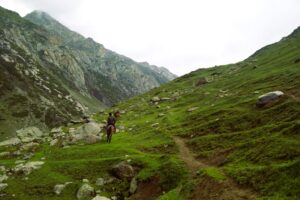
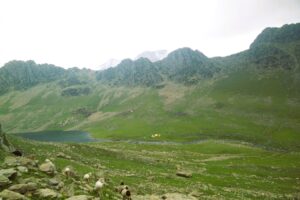

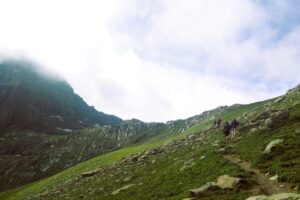
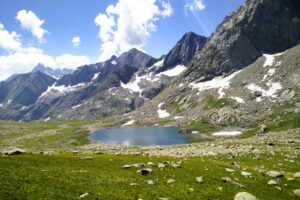
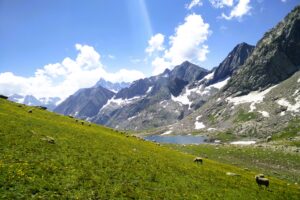
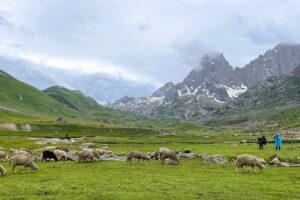

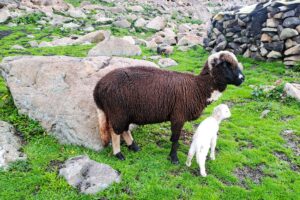

There are no reviews yet.